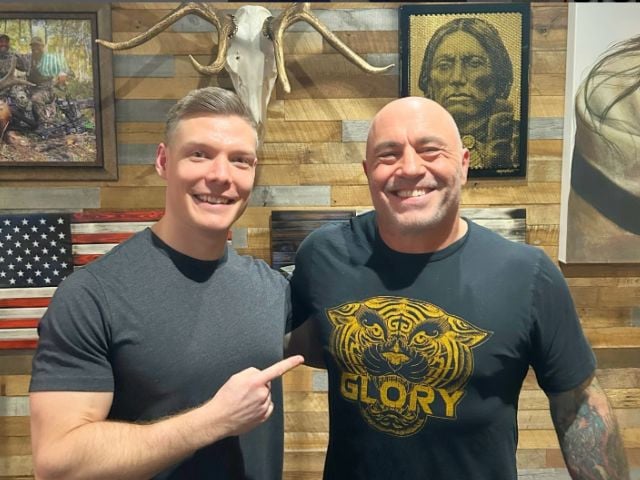Physical Address
304 North Cardinal St.
Dorchester Center, MA 02124
Physical Address
304 North Cardinal St.
Dorchester Center, MA 02124

“Jesus condemns moralism…if Jesus is nothing but a moral example, then you can save yourself and you don’t need him.” –Wesley Huff
In a recent episode of the Joe Rogan Experience, Canadian apologist Wesley Huff engaged in a captivating discussion of early Christian manuscripts and their modern implications. Though the Joe Rogan podcast may be considered inappropriate in Christian circles (language, vulgar jokes, etc.), what can be said about the platform is that it is an environment where many diverse perspectives collide.
In this episode, Wes was able to provide a thoughtful, well-prepared voice that made an impact far beyond his encyclopedia-like knowledge of ancient manuscripts. Through his apologetics, he clearly outlined why we can believe the Bible is true and copied correctly throughout the years. However, the biggest take-aways were not necessarily from what was said explicitly, but rather how it was presented. Here are three main conclusions we can glean from their conversation.
Building Bridges, Not Walls
Huff did not go into this podcast with a chip on his shoulder or looking for something to prove. In his dialogue, he demonstrated that effective apologetics is less about winning arguments and more about fostering understanding. Even though there were many of Joe’s comments that he likely personally disagreed with, throughout the conversation Wes listened intently, asked clarifying questions, and responded with humility and respect.
At one point Wes politely asked Joe, “What about you? What do you believe about Jesus?”. Through his dialogue, it was apparent that Huff’s goal was not to argue Joe into eternity. Wes was willing to share what he believed about his convictions while respecting Rogan’s alternative perspective in good faith.
Too often, conversations between people of different faiths—or no faith at all—turn into heated debates. “You’re wrong and here is why”. But the goal of conversational apologetics isn’t necessarily to “win”, but rather to bridge gaps and create spaces for deeper connection.
Application: The next time you talk with someone about your faith who challenges your beliefs, prioritize understanding over proving your point. Be curious and compassionate, reflecting the character of Christ in your tone and demeanor.
Preparation is Power
Huff’s ability to articulate the Christian worldview clearly and confidently didn’t happen by accident. He has spent years studying theology, history, and philosophy, equipping himself to answer tough questions thoughtfully. Whether you disagreed with Wes or not, you cannot argue that he is well-versed in the texts that he claims to hold authority.
In a world where misinformation spreads quickly, believers have a responsibility to know what they believe and why. This doesn’t mean everyone needs to be an expert or hold a seminary degree, but it does mean we should take our personal discipleship seriously. Whether it’s reading Scripture regularly, diving into apologetics resources, or attending church courses designed to grow our understanding, preparation allows us to engage in conversations with both courage and kindness.
Application: Identify one area where you’d like to grow in your understanding of the Christian faith—perhaps answering tough questions about science, morality, or the reliability of the Bible.
*Note* Reject the trap of comparison. You will likely come across many high-intelligence experts that may cause doubts of your own ability. Hearing Wes breakdown ancient manuscripts which such detail, it’s easy to think something similar to, “I will never be able to reach that level of expertise, why bother?”. While it may be true that you never reach the point of becoming the definitive expert over a certain topic, remember that God has called you to be faithful where He has placed you. Learn to grow within your ability and to be comfortable standing on the shoulders of giants.
Witness, not Salesman
Huff’s demeanor on the podcast reflected a key principle of Christian engagement: we are witnesses, not salespeople. Our job is not to coerce or manipulate but to point others to Christ through our words, actions, and attitudes.
Through the dialogue, Wes showed a powerful ability to empathize with Rogan’s doubts and struggles. Instead of dismissing them, Huff validated Rogan’s right to ask the tough questions and explored those doubts with genuine interest.
Empathy creates a safe environment for dialogue. When unbelievers feel heard and respected, they’re more likely to engage openly. Jesus Himself modeled this when He met people where they were. He did not admonish questions that came from a sincere heart, but continually answered their questions and needs with compassion.
Application: In your conversations with unbelievers, focus on sharing your faith authentically, without the need to “seal the deal.” Trust that God will use your words in His timing.
Final Encouragement
Joe Rogan’s conversation with Wesley Huff was a reminder of the critical role Christians have in today’s cultural conversations. By approaching dialogue with empathy, preparation, and humility, you and I can create opportunities for the Gospel to shine in a world that desperately needs truth and grace.
Be ready. Be bold. Be kind. And most importantly, trust God to work through every conversation.
What about you? How can you step into meaningful dialogue with unbelievers this week? Let’s follow Huff’s example and be voices of truth and compassion in our own spheres of influence in a growing secular world.
